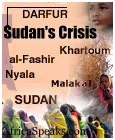 |






 AfricaSpeaks Weblog AfricaSpeaks Weblog
 Rootswomen Weblog Rootswomen Weblog
 Rootsie's Weblog Rootsie's Weblog
|
Oil Embargo Threat Explains Bush Policy Change on Palestine
Posted: Thursday, April 4, 2002
Oil Embargo Threats Carry More Weight
http://www.stratfor.com
Summary
The threat of an oil embargo against the West, particularly the
United States, has more weight in light of the current violence
in the Palestinian territories. However, an embargo seems
unlikely for a number of reasons. Any targeted state would be
able to procure replacement oil from a number of sources.
Furthermore, those that would be hit hardest by an embargo
include countries in Asia that are sympathetic to the Palestinian
cause and are still struggling with the effects of Asia's own
regional recession.
Analysis
Stripped of the Middle East's political complications, the
underlying energy market is broadly stable. That does not mean
oil prices are likely to drop back into the $15-per-barrel range.
The escalation of the Israeli-Palestinian crisis has nurtured a
climate in which spurious threats can develop quite long legs.
Recent threats of embargos against the United States may not hold
any more weight than they did last year, but against a bloodier
backdrop, they carry more significance.
Oil prices have moved up from lows of $16.60 a barrel in November
2001 to a high of $27 a barrel on April 5. Yet despite this
recent price rise, the oil market's underlying fundamentals are
largely stable. Typically spring is the season of weakest demand,
but a rapidly recovering American economy is helping pick up the
slack. Furthermore, the increase in U.S. military demand for oil
is helping prices spike.
There are only two systemic factors that might upset this
equilibrium before 2003. First, Angola and Russia are both
dramatically expanding their production capabilities. By year's
end the two countries will likely be pumping another 500,000 bpd
collectively. Second, the lack of investment in the oil sector by
Venezuelan President Hugo Chavez has gutted that country's long-
term ability to function as a major oil supplier. Venezuela may
also face a short-term problem, with oil workers from the state-
owned Petroleos de Venezuela (PDVSA) threatening a strike that
could shut down production temporarily.
But while the oil markets themselves can be analyzed on a long-
term basis stripped of political factors, these complications
must be included when generating short-term analysis. That is
particularly true in the current case given that political
factors -- specifically the current Israeli-Palestinian conflicts
-- are almost wholly behind the oil price surge in recent weeks.
Certainly major U.S. military actions in the region would
heighten oil prices. However, despite the latest statements of
the Bush administration, current U.S. deployments do not show
this as imminent.
The key here is not Palestinian militants, but Israel's reactions
to them. While the level of violence may cause the markets to
become jittery, Palestinians are neither major producers nor
consumers of oil. It is the Israeli retaliation to Palestinian
attacks -- and then wider Arab reactions to those Israeli actions
-- that really make the oil markets jump. These actions and
reactions have added about a $5 per barrel premium in the oil
markets.
This premium, however, is likely to hold in place only so long as
the region remains tense. If there are no bombings and no
retaliation, there will be no international condemnations, and
tensions will alleviate, at least in the short term. Meantime the
tensions provide a climate that heightens the significance of
threats that would previously have been dismissed out of hand.
Iranian supreme leader Ayatollah Ali Khamanei made such a threat
April 5 when he called upon all Muslim states to "shake the
world" by halting oil exports to "pro-Israel" Western states.
Such an embargo is unlikely since without accompanying revenue
and production cuts, any targeted state can easily procure oil
from alternative producers. Furthermore, any serious embargo that
includes real production cuts would inflict far more harm upon
countries that are sympathetic to the Palestinian cause,
particularly in Asia.
This, obviously, hasn't stopped Khamanei from threatening a
potential embargo. Indeed, his simply making the proposal at
Friday prayer services in Tehran jacked oil prices up to $27 per
barrel, a level not seen since the week immediately after Sept.
11.
Short-term prices would certainly skyrocket if an embargo did
indeed occur because other producers lack the spare capacity to
cover the shortfall. Under the kindest of estimates, Mexico and
Norway can add only 200,000 bpd each. Angola and Russia might be
able to accelerate their production plans, but neither has any
spare capacity to bring on line. The two non-Muslim OPEC states -
- Nigeria and Venezuela -- can add only 400,000 and 300,000 bpd.
In the event of massively high prices, Venezuela could tap its
vast tank farms and potentially add 1 million bpd for 70 days
from existing stocks. But even this could hardly lessen the
impact of a concerted effort to cut supplies to the United States
by Muslim producers who collectively control over 20 million bpd
of production.
Still, in the unlikely event of an actual embargo, the Muslim
producers would quickly discover the weaknesses of their actions.
The West is not nearly as dependent upon oil as it was in 1973.
The United States consumes only 60 percent as much oil per dollar
of GDP generated as it did in 1973. It is the reverse situation
for most of Asia. For an oil embargo now to deliver the same
level of economic shock to the West as did the 1973 energy
crisis, the per barrel price would need to hit $90, a target well
beyond the Muslim world's ability to deliver. Any oil embargo
large enough to actually harm the West would decimate Asia,
including Muslim countries, which has yet to recover from the
2001 global recession.
 Printer friendly version Printer friendly version
 Send page by E-Mail Send page by E-Mail
|








